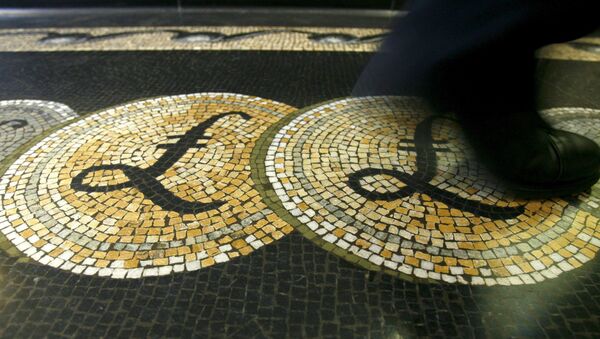Kristian Rouz – The British Chambers of Commerce (BCC) adjusted their outlook on economic growth for the next year downward by more than half, to just 1 percent for the year, citing post-Brexit uncertainty, which has resulted in lower business investment.
The lion's share of uncertainty is due to the possible effect of the combination of all of these factors on consumer sentiment, with domestic consumption ultimately driving almost 80 percent of the UK’s GDP.
The BCC said that in 2017 the UK’s economy would probably expand by just 1 percent, compared to an earlier estimate of 2.3 percent for the entire year, meaning the slowest growth since post-crisis 2009, when the plunge in the financial sector was still affecting the economy's ability to re-emerge from the global recession.
The 2018 growth outlook was also downgraded to 1.4 percent from the previously expected 2.4 percent. The BCC estimated the lower investment would eventually result in lower consumer spending as the UK’s prospects outside of the EU have been deemed unclear.
"The downgrades to our growth forecast confirm that the UK economy is set to enter a turbulent period, with growth expected to weaken materially in the near term," Suren Thiru, Head of Economics at BCC, said. "Mounting uncertainty is likely to put a brake on investment, while rising inflation and moderately weaker labor market conditions are expected to stifle consumer spending."
Additionally, the BCC expects another cut in base borrowing costs from the Bank of England (BOE), even though the regulator had previously stated that monetary policy activity had reached the limits of its efficiency in the current circumstances, having highlighted the necessity of pro-active fiscal stimulus measures and possible deregulation, generally falling in line with the New Tory agenda in Westminster.
However, the business group said that this year the UK’s economy would grow 1.8 percent, a downgrade from the previously expected 2.2pc. This represents a modest downgrade, given the Brexit and all the associated turmoil which unraveled this year, and the situation is still far from settled.
"Although individual businesses continue to report strong trading conditions, the overall picture suggests a sharp slowdown in UK growth lies ahead," Adam Marshall, acting director general of the BCC, commented.
However, the BCC noted the positive developments for the UK’s foreign trade positioning, having preferred to downplay their significance.
"Despite the likely improvement in the UK’s trade position, the significant imbalances currently facing the UK economy are expected to persist through the forecast period, with a continued over-reliance on services and consumer spending as key determinants of UK economic growth," Thiru said.
Previously, Liam Fox, the UK’s international trade secretary, commented that Britain is “too lazy and fat”, referring to businesses’ insufficient efforts in propelling the nation's growth as long they manage to stay in the positive territory instead of pursuing more aggressive expansionist strategies.
"This country is not the free-trading nation it once was. We have become too lazy and too fat on our successes in previous generations," Fox said.
"Companies who could be contributing to our national prosperity — but choose not to because it might be too difficult or too time-consuming or because they can't play golf on a Friday afternoon — we've got to be saying to them if you want to share in the prosperity of our country, you have a duty to contribute to the prosperity of our country," he added.
Subsequently, it is up to the Theresa May cabinet to take action spurring business activity is order to overcome the downward pressures on the economy. A combination of stimuli of the taxation and regulation side might do the trick, while decisive measures to boost employment and raise wages are expected to spur consumption to a new level. Another main goal is to boost business confidence in order to counter the remaining post-Brexit anxiety, and fiscal stimulus seems to be a proper start.




